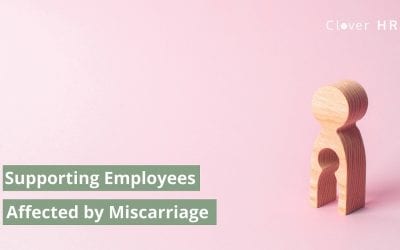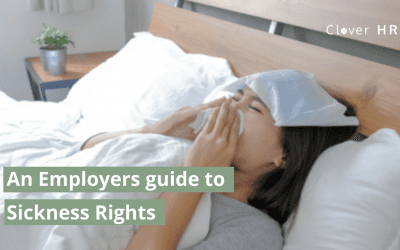What Is Unfair Treatment at Work? Unfair treatment at work refers to behaviours or actions that make an employee feel targeted, undervalued, bullied or harassed. It occurs when an employee is treated in a way that is different from their peers for reasons that aren’t...
Category:
Advice & Tips
In-House vs. Outsourcing HR: How Do I Determine Which Option is Best For My Business?
Human resources (HR) play a vital role in any business. They provide companies with the support to flourish and achieve long-term success. It’s something nearly every business requires to stay legally compliant, so how do you decide between outsourcing HR and in-house...
Navigating HR Compliance: Essential Guide for UK SMEs in 2024
How An HR Consultancy Keeps You Compliant In the UK, modern laws, regulations and standards are designed to protect employees from unfair treatment by ensuring balanced and equitable workplace practices. For SMEs, understanding these laws and implementing policies and...
Navigating HR Challenges: 5 Ways HR Consultancies Aid SMEs
In the fast-paced and ever-changing landscape of small and medium-sized enterprises (SMEs), achieving success is a journey full of unique challenges. From talent acquisition and compliance to employee development and well-being, an organisation’s HR support is a...
Remote Work Revolution: A Complete Guide for SMEs
Remote Work Revolution: A Complete Guide for SMEs Over the last few years, the landscape of business has shifted towards remote work becoming less of a novelty and more of a reality. Across the United Kingdom, Small and Medium-sized Enterprises (SMEs) are adapting to...
Breastfeeding in the Workplace: Supporting Working Mothers
Breastfeeding is a natural and essential part of motherhood, providing numerous health benefits for both the baby and the mother. However, for many working mothers, the decision to breastfeed can be challenging due to the lack of support and understanding in the...
Stress Awareness
Stress awareness month has been held in April since 1992 raising awareness of what causes and what cures there are for our increasing modern day stress epidemic Stress is something that everyone feels at times, especially when dealing with change or life challenges...
How to answer the interview question: Why do you think you are suitable for this role?
Why this is a common question. This is a common interview question as the interviewer needs to ascertain why out of all the other candidates you should be offered the role and why you will be an asset to the organisation. This is one of many questions the interviewer...
Supporting employees with diabetes
What is diabetes? There are 2 main types of diabetes: Type 1 – where the body attacks cells that provide insulin Type 2 – where the body doesn’t produce enough insulin, or the body doesn’t react to insulin The majority of people with diabetes in the UK have Type 2. A...
The Benefits of Implementing an EAP – Employee Assistance Programme
What is EAP? An EAP is a workplace wellness programme. The goal of an EAP is to provide employees with the tools and resources that they need to improve their mental health and help balance their work/life. According to the CIPD: “Mental health-related absence is the...
The benefits of an email switch off policy
An email switch off policy encourages all employees to log out of their work email accounts and intranets outside of their regular working hours. With many employees continuing to work from home or in hybrid working arrangements, the benefits of an employee’s right to...
Employee Absence: What are your Rights as an Employer?
Employee absence is a significant cost for many businesses, yet research suggests that only a minority of employers monitor that cost. Apart from annual holiday entitlement, an employee may need time off for the following reasons: Short term or long term sickness,...
Strategies to Reduce Employee Absenteeism in the Workplace
Strategies to Reduce Employee Absenteeism in the Workplace Absenteeism causes a financial burden to any business, as well as discontent amongst staff who are left to pick up the workload of an absent colleague. But there are things to be done to reduce absenteeism in...
All you need to know about Adoption, Surrogacy and Maternity leave
Sometimes it can all seem a bit of a minefield for employers when it comes to statutory rights to time off for parents. With a variety of “options” and certain rules regarding notice to be given; it is always wise to sense check the latest government regulations....
Benefits of a HR System
What is HR software? HR software is a ‘human resource management system’ and essentially is a tool to make managing people easier. We are going to explore how it does this and what benefits it gives your business. Some big benefits: Time-Saving You have a...
Religion in the Workplace
Religion and Belief discrimination is illegal in the UK. Religion is a protected characteristic under the Equality Act 2021. Employees in the workplace can belong to various religions and have various beliefs. Employers have a duty to support employees regardless of...
Great ways to answer the interview question; Why do you want to work for us?
This is a common interview question that many candidates will not understand the deeper meaning of, they may think this is a quick easy question I can answer by responding with ‘I have the skills in this area/field of work’ or ‘this is a position I am interested in...
Ways to become a better leader
As a leader, your most important role is to provide clear direction to your employees. A leader must ensure that their team members understand what their individual goal and the team goal is and how to work towards achieving them. To develop yourself to become a...
What to Wear to an Interview – A Guide for Women
Feeling confident, and doing well in an interview starts with preparation…and a great interview outfit that you feel comfortable in. When you receive that exciting invite, take note of the detail, paying particular attention to anything you need to do ready for the...
Supporting Employees Affected by Miscarriage
Unfortunately, one in four pregnancies ends in miscarriage. A miscarriage can affect a woman and her partner in different ways, and both will need support and help from their employers if they suffer a miscarriage. However early a miscarriage takes place it is a loss...
Performance Related Pay – Can Businesses Benefit?
What is Performance Related Pay? Performance related pay (PRP) is a process that links an employee’s salary increase to their individual performance. The concept of PRP is that performance is measured against pre-agreed objectives agreed between a manager and...
Drug and Alcohol Abuse at Work
Before we get started, here are some statistic for employers taken from Alcohol Change UK; More than 25 million adults in England regularly drink alcohol. Lost productivity due to alcohol use costs the UK economy more than £7 billion each year. 35% of people say...
Employer’s Guide to Sickness Rights
Excluding sickness absence due to the coronavirus pandemic, sickness absence rates in the UK have fallen to their lowest records at 1.7% in the private sector, with experts advising employees are coming into work when they are unwell. Here are some (pre COVID-19)...
Unlawful Deduction of Wages
An unlawful deduction of wages occurs when an employee has either been unpaid or has been underpaid their wages by their employer for some reason. There must have been an actual deduction of wages, not just a threat or proposal to deduct money, for it to be classed as...
Guide to Remuneration Packages and Benefits | What Employers Need to Know
Employers use competitive remuneration packages to attract and retain the very best employees. Skilled and high-quality talented individuals are constantly in high demand and many businesses are in competition with one another. A good remuneration package adds to an...
Unauthorised Absence from Work: An Expert Guide
Unauthorised absence refers to a situation where an individual fails to come to work without providing a reason or notifying their employer. It is also commonly referred to as ‘AWOL’ (Absent Without Leave) or ‘Absent Without Permission.’ Read on to learn more about...
How to Make Changes to Terms and Conditions of Employment
Employers may look to change employees’ terms and conditions of employment for several reasons including: Reduce pay or benefits; Change employees’ responsibilities; Change to working hours or days; Change to an employee’s place of work. Employers should consider...
Jury Service – What Employers Should Know…
What is Jury Service? Jury Service is a public duty within the UK, where individuals can be called to serve on active UK court cases such as assault, fraud and murder. As it’s a public duty, fines can be issued against individuals who do not turn up for jury service....
What Are The Different Types of Employment Status?
In the UK there are three different types of employment statuses under the Employment Rights Act 1996. Make sure you’re aware of yours and, as an employer, the status of each of your workforce. What is an Employment Status? A person’s employment status is what defines...
Summary Dismissal Guide – What You Need to Know
What is summary dismissal? Summary dismissal is when an employee is dismissed with immediate effect without any notice or pay in lieu of notice (PILON) Summary dismissal normally occurs when an employee has committed gross misconduct. Gross misconduct can be justified...
Unpaid Leave: Definitive Guide to Managing Employee Unpaid Leave
What is Unpaid Leave? Unpaid leave in the UK is when an employee takes time off work and has no legal right to be paid for the time away from work. There is little legislation relating to the unpaid leave entitlement, however, there are two areas where unpaid leave is...
Benefits of Coaching in the Workplace
Why is coaching becoming so popular and sought-after Personal development and coaching are becoming hugely popular in the workplace as the millennial generation seek the fastest way to become successful and improve their earning potential at work. Many workers are...
Direct & Indirect Discrimination in the Workplace | What You Need to Know
Direct discrimination is when someone is treated unfairly because of a protected characteristic. Under the Equality Act, there are nine protected characteristics which include; age disability gender reassignment marriage and civil partnership pregnancy and maternity...
Change Management
Change management is a structured approach for ensuring that changes are thoroughly and smoothly implemented, and that the lasting benefits of change are achieved. It requires businesses to define and adopt strategies, structures, procedures, and technologies to cope...
Top 13 HR Policies for Small Businesses
With so many HR and employment policies recommended to businesses, it can be difficult to know which are the most essential. Keep reading to learn the top 13 HR policies a company should have to stay compliant with employment contracts and UK employment law. What are...
Employee Voice; The Importance Of Listening To Employees
Unless employees are confident enough to speak out, issues like sexual harassment, discrimination, health and safety failings and unethical behaviour can be hidden in a business. Employee voice is about the people being able to communicate their views to their...
Creating an Effective CV
In the ever-changing working landscape, it is more important than ever to have a strong CV (Curriculum Vitae), highlighting your skills and experience to maximum effect. With the average time you have to grab an employer’s attention down to around seven seconds, you...
Health & Safety Policy for Small Businesses – All you need to know
As a small business owner, you will wear many hats, balancing varying responsibilities and demands. Managing health and safety arrangements does not have to be complicated, but should always be a priority, as the cost of breaching health and safety could be severe....
Dismissing an Employee – What Employers Need to Know
What is Dismissal? Dismissal is the termination of employment by an employer against the will of the employee. Any dismissal that occurs must be shown to have followed a fair procedure. When to dismiss an employee? Dismissal is normally deemed fair only if you...
The Power of the Employer Brand
Whether it something you realise or not, all companies have an employer brand – it’s essentially the company’s reputation and what people think of you as an employer. The CIPD define employer brand as; ‘a set of attributes and qualities, often intangible, that makes...
Appraisals – A Performance Review Guide for Line Managers
Appraisals (performance reviews) are a great opportunity for good line managers to feedback to employees on their performance over the review period. There are many benefits to conducting regular appraisals, including, but not limited to; improved business performance...
Probationary Periods – What You Need To Know.
What is a probationary period? A probationary period is a contractual period of time at the start of an employment contract between a new employee and an organisation. During the probationary period the employee can be exempt from some contractual rights, e.g....
Apprenticeships “Grow Your Own Staff”
Apprenticeships “Grow your own staff” Recent employment figures show that the market for attracting good employees is shrinking as the numbers of unemployed people diminish and the rate of employed people rises. The young are a group of people that often struggle to...
Top Tips to Avoid Employment Tribunal
With fees no longer in place and employment tribunal claims on the rise, we are here to give you some top tips on how to avoid costly tribunal cases. Documentation Ensure you get back to basics and have clear policies and procedures so both the business and employees...
Investigations: The Role of the Investigation Officer
Investigations: The Role of the Investigation Officer is Key All Employers have situations where an Employee misbehaves or becomes comfortable and complacent in their employment or the role that they do. On these occasions things may occur that require addressing via...
5 Ways That CEO’s Can Inspire Their Teams
When it comes to planning for the future, CEOs are expected to know it all. Not just finding the right candidate, they are also responsible for inspiring their team to generate new ideas and constantly improve on performance. Of course, it isn’t always easy. Here are...
World Health Day
Since 1950 the 7th April has been known as ‘World Health Day’ to help raise awareness and ensure that everyone globally has access to quality health services. The World Health Organization (WHO) choose a worthy health theme for their campaign annually to highlight...
Managing Stress in the Workplace
Stress is a state of mental health which affects all of us at some point during our lives, and specifically, our working life. It is our body’s way of responding to pressure from the occurrences in our lives. When the human body feels stress, it goes into fight or...
HR Transformation: Key Points to Digital Transformation
The digital age is fully upon us and technology is definitely not going anywhere, it is only becoming more relied upon and more intelligent. With this in mind, revisiting and revamping the HR technology in place in your business may be a key step to grow with the...
Keeping Your Employees On Side
Avoid having to red card your employees for unreasonable behaviour or demands during the World Cup period. If you want to hear about our previous experience of helping manage employees around such sporting events get in touch. World Cup fever will take over...
A Guide to Employee Handbooks – What You Need to Know
A handbook should be available for every member of staff. It is often the only literature given to personnel. Whether in a book format, or as a set of documents, this information can prove vital in protecting your business. Is it a legal requirement to issue a...
8 tips for managing absence in the workplace
What is absence management and why it's important? Absence management is when employers have processes and policies in place to help deal with employee absences and to keep levels to a minimum. It is important for employers to have good absence management processes in...



















































